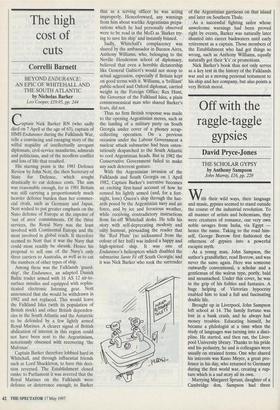The high cost of cuts
Correlli Barnett
BEYOND ENDURANCE: AN EPIC OF WHITEHALL AND THE SOUTH ATLANTIC by Nicholas Barker Leo Cooper, f19.95, pp. 244 Captain Nick Barker RN (who sadly died on 7 April at the age of 63), captain of HMS Endurance during the Falklands War, tells a convincing and enraging story of the wilful stupidity of intellectually arrogant diplomats, civil-service mandarins, admirals and politicians, and of the needless conflict and loss of life that resulted.
His starting point is the 1981 Defence Review by John Nott, the then Secretary of State for Defence, which sought drastically to cut defence costs. The aim was reasonable enough, for in 1981 Britain was still carrying a proportionately much heavier defence burden than her commer- cial rivals, such as Germany and Japan. Nott wished to put greater emphasis on the Nato defence of Europe at the expense of `out of area' commitments. Of the three services, the Royal Navy was the least involved with Continental Europe and the most involved in global reach. It therefore seemed to Nott that it was the Navy that could most readily be shrunk. Hence his proposal to sell one of the Navy's only three carriers to Australia, as well as to cut the numbers of other types of ship.
Among these was the Falklands 'guard- ship', the Endurance, an adapted Danish Baltic trader armed with 16 AS 12 air-to- surface missiles and equipped with sophis- ticated electronic listening gear. Nott announced that she would be withdrawn in 1982 and not replaced. This would leave the Falkland Isles (with its population of British stock) and other British dependen- cies in the South Atlantic and the Antarctic to be defended by a few lightly armed Royal Marines. A clearer signal of British abdication of interest in this region could not have been sent to the Argentinians, notoriously obsessed with recovering 'the Malvinas'.
Captain Barker therefore lobbied hard in Whitehall, and through influential friends such as Lord Shackleton, to have this deci- sion reversed. The Establishment closed ranks: to Parliament it was averred that the Royal Marines on the Falklands were defence or deterrence enough; to Barker that as a serving officer he was acting improperly. Henceforward, any warnings from him about warlike Argentinian prepa- rations which he had personally observed were to be read in the MoD as 'Barker try- ing to save his ship' and instantly binned.
Sadly, Whitehall's complacency was shared by the ambassador in Buenos Aires, Anthony Williams, who, belonging to the Neville Henderson school of diplomacy, believed that even a horrible dictatorship like General Galtieri's would not stoop to actual aggression, especially if Britain kept on good terms with it. Williams, a 'brilliant' public-school and Oxford diplomat, carried weight in the Foreign Office; Rex Hunt, the Governor of the Falkland Isles, a plain commonsensical man who shared Barker's fears, did not.
Thus no firm British response was made to the opening Argentinian moves, such as the landing of a military party on South Georgia under cover of a phoney scrap- collecting operation. On a previous occasion under the Labour Government a nuclear attack submarine had been osten- tatiously despatched to the South Atlantic to cool Argentinian heads. But in 1982 the Conservative Government failed to make any such deterrent gesture.
With the Argentinian invasion of the Falklands and South Georgia on 1 April 1982, Captain Barker's narrative becomes an exciting first-hand account of how he conned his lightly armed (and, for a fort- night, lone) Queen's ship through the haz- ards posed by the Argentinian navy and air force, and by ice and ferocious weather, while receiving contradictory instructions from far-off Whitehall desks. He tells his story with self-deprecating modesty and salty humour, persuading the reader that the 'Red Plum' (so nicknamed from the colour of her hull) was indeed a happy and high-spirited ship. It was one of Endurance's helicopters which disabled the submarine Sante Fe off South Georgia; and it was Nick Barker who took the surrender of the Argentinian garrisons on that island and later on Southern Thule.
As a successful fighting sailor whose unwelcome warnings had been proved right by events, Barker was naturally later shunted into career backwaters until early retirement as a captain. Those members of the Establishment who had got things so wrong, such as Anthony Williams, equally naturally got their 'k's' or promotions.
Nick Barker's book thus not only serves as a key text in the history of the Falklands war and as a moving personal testament to his ship and her company, but also points a very British moral.


































































 Previous page
Previous page